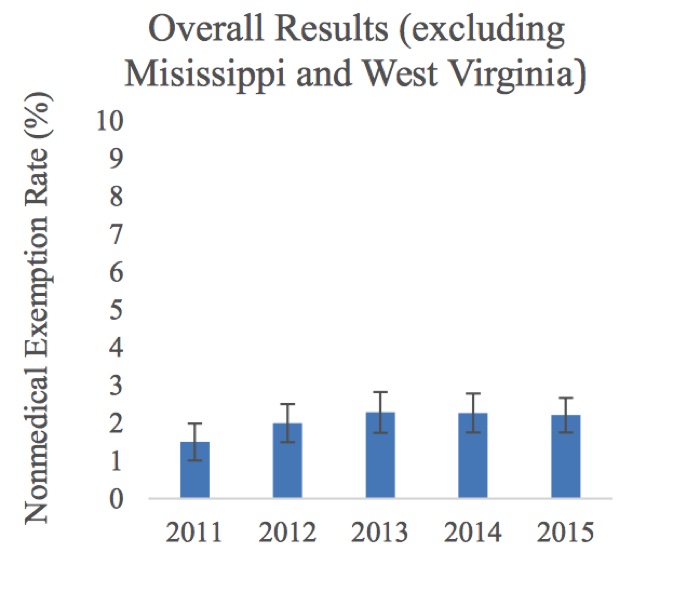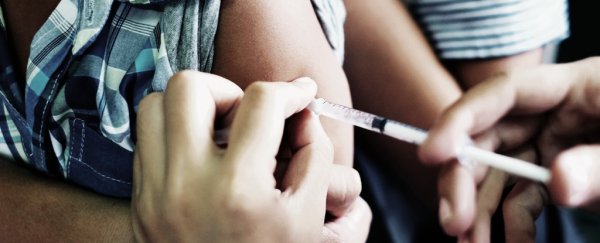It hasn't been the best year for parents worrying about the spread of what should be preventable infectious diseases.
Minnesota's measles outbreak in April was the state's worst such epidemic in decades, so bad it led to more confirmed cases than the whole US saw in 2016. But a hopeful new study suggests that by one measure at least, the threat of the anti-vaccine movement may be fading.
According to an analysis of kindergarten vaccine exemption rates in the US between 2011 and 2016, the number of parents refusing to vaccinate their children on non-medical grounds peaked in 2013 and actually fell slightly thereafter – although the decrease is so marginal it's effectively a stabilisation.
The finding comes from a team of researchers at Emory University, who examined nation-wide data on parents who held off from vaccinating their children for religious and/or philosophical reasons.
 (Open Forum Infectious Diseases)
(Open Forum Infectious Diseases)
In the period the study was conducted, these kinds of non-medical exemptions were possible in 48 states, with Mississippi and West Virginia being two notable exceptions.
In the areas allowing vaccine refusal on non-medical grounds, these exemptions did rise on average over the course of the study from 1.75 percent of all exemptions during 2011–2013 to 2.25 percent from 2013- 2016.
Of course, that's not good, and it's just the latest data showing how non-medical exemptions have been on the rise since 1991.
But what those grouped percentages mask is that the number of non-medical vaccine refusals actually started to drop ever so slightly in 2014 and 2015, with 2013 representing the peak of the curve.
"Our study shows an increase in non-medical exemptions through the 2012–13 school year, which then plateaued," the authors explain in their paper.
"This is the first time since the late 1990s that we have seen such stabilisation."
While it's hard to get too excited about a levelling in the curve that effectively preserves non-medical vaccine refusals at their highest level in decades, we can be thankful the stabilisation is there at all – and it's quite possible the rate of non-medical exemptions could now fall significantly.
"So far the signs are encouraging," one of the researchers, epidemiologist Saad Omer, told Vox.
While the study doesn't focus on what ultimately caused the plateauing to occur, the team acknowledges the probable impact of "considerable efforts by medical and public health authorities to address vaccine hesitancy and media attention focused on outbreaks of disease involving vaccine refusals and non-medical exemptions."
That media attention is stuff like this: reports on how measles outbreaks in the US are on the rise thanks in part to unvaccinated people, which isn't all that surprising since we now know that even a small drop in vaccinations can lead to a three-fold increase in measles cases.
The so-called link between vaccines and autism has also been thoroughly debunked, but despite this kind of information being publicly available, there are still huge numbers of misinformed people using decidedly dubious science to justify refusing to vaccinate their children.
And in some places, like Texas, non-medical exemptions are bucking the national trend, and are still steeply rising.
"We are still seeing an aggressive increase in non-medical exemptions [in Texas]," paediatrician Peter Hotez from the Baylor College of Medicine, who wasn't involved with the study, told Vox, "with at least 52,000 last year, up from 45,000 the year before."
Elsewhere there are promising signs. Since the study was conducted, California eliminated all non-medical exemptions, and Vermont eliminated philosophical exemptions.
If other states begin to follow their lead and make it harder for parents to refuse vaccinations on non-medical grounds, we could really see a positive turnaround here.
It wouldn't be the first time.
The findings are reported in Open Forum Infectious Diseases.
